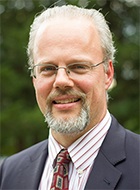
We come now to our final section in this six-part series,[1] in which we have asked the question, How Can I Know For Sure?[2]
We conclude with a reminder of our opening questions. Rejecting the closed circle of human reason, we have exposed an entirely different Source for understanding ultimate questions. The answers to such questions come not from within (by human ingenuity), but from without (by divine intervention). Understanding comes by divine, gracious, and redemptive intrusion. How? By the Spirit of the Word working with the Word of the Spirit.
Why is this persuasion so persuasive? Because it is God’s work with God’s Word. Scripture possesses unqualified authority and delivers unqualified confidence, because of its supreme Author. God the Spirit takes his revealed Word, opens our eyes to it, and mercifully and persuasively seals it on our hearts. Only when we have our minds and hearts opened to the truthfulness of Scripture, do we find peace, confidence, and contentment.
Scripture then does not present some parallel alternative, adding to the smorgasbord of human postulates – philosophical, religious or otherwise. It brings the only answer, the divine one. The decision has already been made. God answers ultimate questions ultimately. He could do no less. His word is truth and there is no real competition. The Lion has roared and we hear his mighty voice.
As the Word of God, the Bible accordingly requires our full allegiance, and provides the authoritative source for addressing ultimate questions. This gracious gift serves as a divine mandate. Any resistance to this Word is a culpable resistance, a continuation of the rebellion condemned in Romans 1. To say no to the divine rescue in the divine Word is to act in final obstinacy. It is to remain in the darkness and to complain that we cannot see.
The Bible does not give answers to every single question. It does not tell me whom to marry. It does not convey whether I am to become a painter, a pilot, or a plumber. It does not provide formularies for fantasy football nor maps to Montana. It does not disclose the periodic table or the best (or any!) recipe for chicken potpie. The Bible does not speak about everything. It does, however, speak to everything. Scripture, properly understood by spiritual eye-opening (called “illumination”), gives the authoritative basis by which we must think about all things.[3] It is the one corrective lens for interpreting life accurately, consistently, and faithfully.
By any accounting, Scripture’s reliability is simply staggering both in its power and its grace. The Creator mercifully does not leave us to our own devices. We are not left to the inadequacies of human postulations. We are not left in the darkness of our willful, religious rebellion. We are not even left in the realm of probabilities and possibilities. We are not left to wander as lost sheep.
No, God has intervened. The persuasion of his Spirit about the gospel and his Word compels us unto belief, grips us with divine grace, and draws us to a place of blessed rest. The very Word of God, which Peter commends to Jesus’ sheep, supplies perfectly safe ground for feasting, nourishment, and protection – for today and tomorrow. Ultimate questions receive ultimate answers. Today and tomorrow are blanketed in divine promise and divine protection. Dwelling in God’s grace, we know for sure.
A final word of caution is in order. It is by the Word of God and the Spirit of God that we possess the sufficient resources for life: “His divine power has granted to us all things that pertain to life and godliness, through the knowledge of him who called us to his own glory and excellence” (2 Peter 1:3). Such divine intentionality for our provision drips with grace and kindness. For those in Western culture, which idolizes the individual, this point needs to be understood in the shared way Scripture presents it.
The Spirit is not a private guide, but the Church’s guide. Scripture is not a book for private interpretation, but Churchly interpretation. The Spirit guides the Church to think rightly about what we read, what we think, and what we experience. The Spirit of Christ is the Spirit of the Church, and the divine gift of understanding is not an individualistic matter. Provisions are for the Church, and the Spirit’s work is always Christ-centered and Church applied. “He who has an ear, let him hear what the Spirit says to the churches.”[4]
We can do little better than close with the prayerful words of Ulrich Zwingli, the influential figure of the Swiss Reformation, whose undying love for God’s Word shaped his reforming efforts in Zurich and captured his own soul with divine confidence:
When you find that the Word of God renews you, and begins to be more precious to you than formerly when you heard the doctrines of men, . . . when you find that it gives you assurance of the grace of God and eternal salvation, . . . when you find that it crushes and destroys you, but magnifies God himself within you, . . . when you find that the fear of God begins to give you joy rather than sorrow, it is a sure working of the Word and Spirit of God. May God grant us that Spirit.[5]
[1] Part 1: “How Can I Know For Sure? Certain Uncertainty”
Part 2: “How Can I Know For Sure? God Has Spoken”
Part 3: “The Uniqueness of the Bible”
Part 4: “The Holy Spirit and the Word of God”
[2] The booklet, How Can I Know For Sure?, contains a series of questions after each section, intended for group discussion. To purchase a copy, go to http://www.reformedresources.org/books/how-can-i-know-for-sure/.
[3] Biblical authority means neither that everything in the Bible is equally clear (Westminster Confession of Faith 1.7), nor that the Bible speaks about everything. Thought Scripture does not address every subject, every subject properly understood must submit to Scripture’s self-attesting authority.
[4] Revelation 3:22.
[5] Ulrich Zwingli, “Of the Clarity and Certainty of God’s Word,” in Zwingli and Bullinger (edited by G. W. Bromiley; Philadelphia: Westminster, 1953), 71; recorded in Jane Dempsey Douglass, “The Lively Work of the Spirit in the Reformation,” Word and World 23.2 (Spring 2003), 124.

The Alliance of Confessing Evangelicals is member supported and operates only by your faithful support. Thank you.
















 © Alliance of Confessing Evangelicals
© Alliance of Confessing Evangelicals


